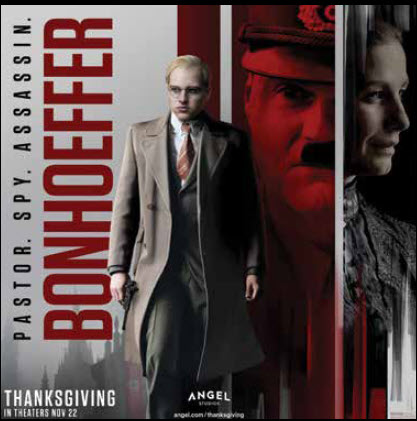On November 22, a beautiful film about a beautiful man will premier all across America. It is simply entitled, Bonhoeffer, and as of this writing more than 50 theatres across the country are sold out in anticipation of its release. This is the work of Angel Studios, with actors no one has ever heard of once again giving seminal performances that may very well be ignored or even vilified by those who hand out little gold statues once a year to themselves and/or each other. No matter; what Dietrich Bonhoeffer did and more importantly, who he was is safe within the shelter of his own writings, and those of others. Such classics as The Cost Of Discipleship, which was published in 1937, and Ethics, which was published posthumously in 1949, are readily available in the form of books — those old-fashioned testaments to peoples’ thoughts and the beliefs that drive them. And, I am grateful in this season of gratitude that we have the freedom to both read, see, and tell the stories of those that the Book of Hebrews describes as being essentially too good for this world.
Because of the fact that I was born a short eight years after the end of World War II, as a child I certainly recognized his name, but knew nothing about him. I just knew that somehow he was a hero, and then I read Eric Metaxas’s biography about Dietrich. Rarely have I read something so finely crafted, and I had the great privilege of meeting Eric once at a National Religious Broadcasters’ conference held in Florida, and had a few seconds to tell him so.
While the Angel Studios offering is not an adaptation of Eric’s work per se, it certainly seems to have the same fine flavor of excellence, and I can hardly wait to see it. The overarching theme is courage and being true to one’s convictions, something we need desperately in our culture, irrespective of political persuasion. While several things stand out to me about Bonhoeffer’s life, there are three that bear being underscored. The first is when he came to America during the 1930s while Hitler was coming to power. Dietrich was a fine theologian as well as a musician, and made music in Harlem. He also preached in black churches, something that was uncommon in that day. The second is that he returned to Germany to care for the flock, and he did not take the opportunity to ride out the storm of the SS in the safety of America. The third is the account of his death. On April 9, 1945, literally a few days before the Allies could save him, he was executed. Not just hanged, but garroted, and on top of that, this modest Lutheran died naked. However, there is a most inspiring account of how Dietrich preparing to see the smile of his Savior was captured by the camp doctor who was forced to view the execution and then pronounce him dead. It inspires me to this day, and is as follows:
“I saw Pastor Bonhoeffer, before taking off his prison garb, kneeling on the floor praying fervently to his God. I was most deeply moved by the way this lovable man prayed, so devout and so certain that God heard his prayer. At the place of execution, he again said a short prayer and then climbed the steps to the gallows, brave and composed. His death ensued after a few seconds. In the almost fifty years that I worked as a doctor, I have hardly ever seen a man die so entirely submissive to the will of God.”
May that be said of us, in life and in death, and this Thanksgiving may we feast upon the grace that can make it so.









